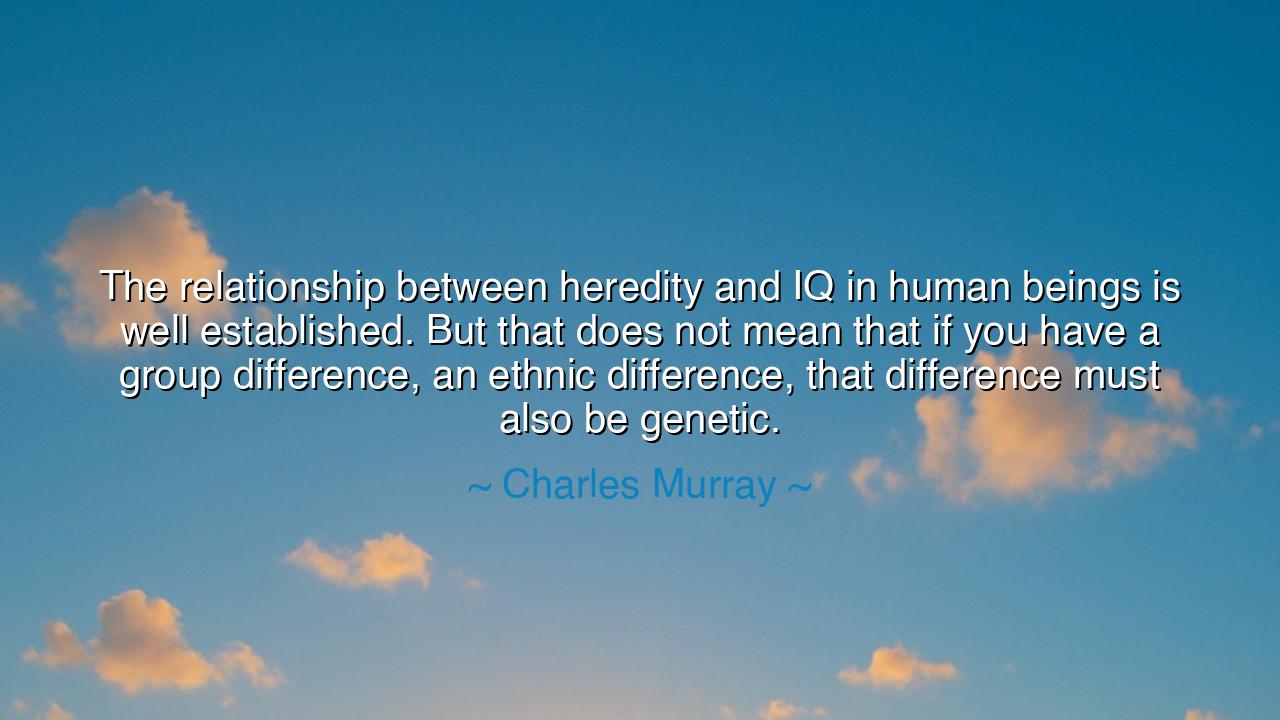
The relationship between heredity and IQ in human beings is well
The relationship between heredity and IQ in human beings is well established. But that does not mean that if you have a group difference, an ethnic difference, that difference must also be genetic.






In the words of the thinker Charles Murray, “The relationship between heredity and IQ in human beings is well established. But that does not mean that if you have a group difference, an ethnic difference, that difference must also be genetic,” there lies a lesson in discernment and humility. He speaks of the delicate balance between what is born within us and what is shaped by the world around us. Though heredity may play a role in the unfolding of human potential, it is not the sole weaver of destiny, for environment, culture, and experience are threads equally strong in the great tapestry of life.
The origin of this truth reaches back to the earliest philosophers and sages who pondered the nature of man. From the scrolls of ancient Greece to the teachings of the East, many have debated whether greatness is inherited by blood or cultivated by discipline and learning. Murray’s words arise from this ancient discourse, warning against the folly of judging entire peoples by measures alone, such as IQ, which capture only fragments of the vast expanse of human capacity.
A group difference or ethnic difference is often the fruit of history’s long journey—of wars fought, lands tilled, knowledge gained or lost, and opportunities given or denied. To assume that such differences are purely genetic is to ignore the shaping hand of society and circumstance. Just as a seed grows differently in fertile soil than in barren ground, so too do individuals and communities flourish or wither based on the conditions they face. The wise understand that nurture and environment are forces as mighty as nature itself.
Thus, these words are a call to wisdom and justice. Let none rush to judgment, for to do so is to cloud the mind with prejudice and blind the heart to truth. A sage leader and scholar must look beyond mere numbers, seeing the shared humanity that binds us all. In this way, the relationship between heredity and potential is honored, but never used as a chain to divide. True understanding lies in recognizing both the gifts of birth and the power of nurture, and in working to create a world where every soul has the chance to rise.






HQNguyen Hoan Quan
This quote challenges the common assumption that ethnic differences in IQ must be genetic, highlighting the importance of not jumping to conclusions about group disparities. But does this mean we should completely dismiss the potential role of genetics in intelligence? How do we reconcile scientific findings with social biases and systemic inequities that might influence the results of IQ tests across different groups? Could this statement be a reminder to approach such complex issues with caution and nuance?
VNVu Nghia
Charles Murray’s remark is thought-provoking because it acknowledges the complexity of the nature versus nurture debate. If we consider ethnic differences in IQ, it’s essential to understand that genetics may not fully explain these differences. How much of the disparity could be due to social factors, such as the quality of education, socioeconomic status, or even bias in testing? Are we oversimplifying the issue by focusing too heavily on heredity and not enough on these external factors?
NQNguyen Quynh
This quote suggests that while heredity plays a role in IQ, group differences—such as those between ethnicities—shouldn’t be automatically attributed to genetics. But how do we account for the role of systemic inequalities and access to resources in education, which can heavily influence IQ test outcomes? Can we trust that IQ tests truly measure intelligence, or are they just a reflection of the opportunities available to individuals from different backgrounds?
-825. Chau Tran Ngoc Quynh - 8/6
Charles Murray’s statement about the relationship between heredity and IQ raises an important distinction between genetic inheritance and cultural or environmental factors. It makes me question how much of intelligence is truly determined by genetics versus external influences. Can we really separate the two, or are both intertwined in shaping human potential? How much weight should we place on environmental factors when discussing group differences in IQ?